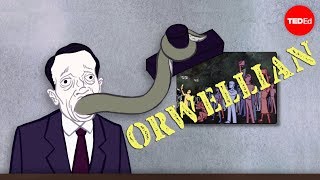(单词翻译:单击)
If you've watched the news or followed politics chances are you've heard the term Orwellian thrown around in one context or another.
如果你看新闻或者关注政治,那么你很有可能听说过“奥威尔现象”频繁地出现在不同的语境中。
But have you ever stopped to think about what it really means, or why it's used so often?
但是你可能会停下来,好奇这个词究竟是什么意思,为什么被这样频繁地使用。
The term was named after British author Eric Blair known by his pen name George Orwell.
这个词是根据英国作家埃里克·布莱尔命名的,他的笔名就是乔治·奥威尔。
Because his most famous work, the novel '1984,' depicts an oppressive society under a totalitarian government,
在他的最著名的作品《1984》中,描述了一个被极权主义政府压制的社会,
'Orwellian' is often used simply to mean authoritarian.
“奥威尔现象”经常被简单地指代专制主义。
But using the term in this way not only fails to fully convey Orwell's message,
但是这样使用这个词不仅并未传达奥威尔的全意,
it actually risks doing precisely what he tried to warn against.
反而有可能适得其反。
Orwell was indeed opposed to all forms of tyranny,
奥威尔确实是反对各种形式的专政,
spending much of his life fighting against anti-democratic forces of both the left-wing and the right.
他倾其一生对抗反民主力量,不论是左翼还是右翼。
But he was also deeply concerned with how such ideologies proliferate.
但是他也非常担心这样的思想滋生扩散的方式。
And one of his most profound insights was the importance that language plays in shaping our thoughts and opinions.
他最著名的一个见解就是,语言在塑造思想和意见中起到重要作用。
The government of '1984''s Oceania controls its people's actions and speech in some ways that are obvious.
《1984》中的大洋国的政府,用一种明显的方式控制了人们的行动和言语。
Their every move and word is watched and heard,
他们的一言一行都被监视,
and the threat of what happens to those who step out of line is always looming overhead.
行为异常的下场时刻威胁着所有人。
Other forms of control are not so obvious.
其他的控制形式没有这么明显。
The population is inundated with a constant barrage of propaganda made up of historical facts and statistics manufactured in the Ministry of Truth.
所有的人民都被蒙蔽在“真理部门”捏造的所谓“史实”和数据中。
The Ministry of Peace is the military. Labor camps are called 'Joycamps.'
和平部负责军事。劳动营被叫做“欢乐营”。
Political prisoners are detained and tortured in the Ministry of Love.
政治囚犯被“友爱部”囚禁和折磨。
This deliberate irony is an example of doublespeak,
这种故意的讽刺就是“双重思想”的一个例证,
when words are used not to convey meaning but to undermine it, corrupting the very ideas they refer to.
言语不为传达却为扭曲其含义,腐坏了每个观点的本意。
The regime's control of language goes even further,
政权的言语控制还有更过分的方法,
eliminating words from the English language to create the official dialect of Newspeak,
从英语中剔除词汇,在新闻媒体上塑造官方说法,
a crudely limited collection of acronyms and simple concrete nouns
一个简陋的、满是缩写和简单名词的集合,
lacking any words complex enough to encourage nuanced or critical thought.
缺乏能够表达细微和关键观点的复杂词汇。
This has an effect on the psyche Orwell calls, 'Doublethink,' a hypnotic state of cognitive dissonance
这就产生了一种被奥威尔叫做“双重思想”的心理现象,一种催眠状态下的认知失调
in which one is compelled to disregard their own perception in place of the officially dictated version of events,
在此状态下,人们被强迫放弃自己的认知,取而代之的是事件解读的官方版本,
leaving the individual completely dependent on the State's definition of reality itself.
使个人完全依附于政府定义下的“现实”。

The result is a world in which even the privacy of one's own thought process is violated,
这样的结果就是个人独立的思维过程被侵犯,
where one may be found guilty of thoughtcrime by talking in their sleep,
梦呓可能被认定是思想犯罪,
and keeping a diary or having a love affair equals a subversive act of rebellion.
写日记或者发生外遇被认为是反叛的颠覆性行为。
This might sound like something that can only happen in totalitarian regimes,
这看起来只有在极权政体下才可能发生的现象,
but Orwell was warning us about the potential for this occurring even in democratic societies.
但是奥威尔警示我们,这种现象在民主社会仍有可能发生。
And this is why 'authoritarian' alone does not 'Orwellian' make.
这就是为什么单单“专制主义”并不等同与“奥威尔现象”。
In his essay, 'Politics and the English Language,'
在他的《政治与英语语言》一文中,
he described techniques like using pretentious words to project authority,
他描述了各种手段,诸如矫饰词汇来形容权威,
or making atrocities sound acceptable by burying them in euphemisms and convoluted sentence structures.
或者用委婉说法掩盖残暴行径使其得到接受,或者迂回扭曲句子结构。
But even more mundane abuses of language can affect the way we think about things.
更平常的语言滥用,也可以影响我们的思维方式。
The words you see and hear in everyday advertising have been crafted to appeal to you and affect your behavior,
我们每天在广告中看到听到的言论都是为了吸引观众和改变其行为而塑造的,
as have the soundbites and talking points of political campaigns which rarely present the most nuanced perspective on the issues.
政治竞选中的评述和论点亦是如此,这些都很少表达出细致的观点。
And the way that we use ready-made phrases and responses gleaned from media reports or copied from the Internet
在我们使用这些媒体报道中现成的短语或者评论,或者从网络上复制内容的时候,
makes it easy to get away with not thinking too deeply or questioning your assumptions.
就很少再去深刻思考,或者质疑前提假设。
So the next time you hear someone use the word Orwellian, pay close attention.
下一次你听到某人使用“奥威尔现象这次词”的时候,可要注意了。
If they're talking about the deceptive and manipulative use of language, they're on the right track.
如果他们说的是对语言的欺诈性和操控性使用,这是正确的使用方式。
If they're talking about mass surveillance and intrusive government,
如果他们说的是大规模监视和干预型政府,
they're describing something authoritarian but not necessarily Orwellian.
那他们更像是在说“专制主义”,而不一定是“奥威尔现象”。
And if they use it as an all-purpose word for any ideas they dislike,
如果他们试图用万能词汇描述他们反对的观点,
it's possible their statements are more Orwellian than whatever it is they're criticizing.
那么有可能他们正表现出了“奥威尔现象”,而非他们所批评的内容。
Words have the power to shape thought.
词汇有塑造思维的力量。
Language is the currency of politics,
语言是政治的流通货币,
forming the basis of society from the most common, everyday interactions to the highest ideals.
从日常互动到高级理想,建立社会的基础。
Orwell urged us to protect our language
奥威尔劝告我们去保护我们的语言,
because ultimately our ability to think and communicate clearly is what stands between us and a world where war is peace and freedom is slavery.
因为,思考和交流的能力正是我们与一个颠倒的世界之间的屏障,在那里,战争即和平,奴役即自由。


